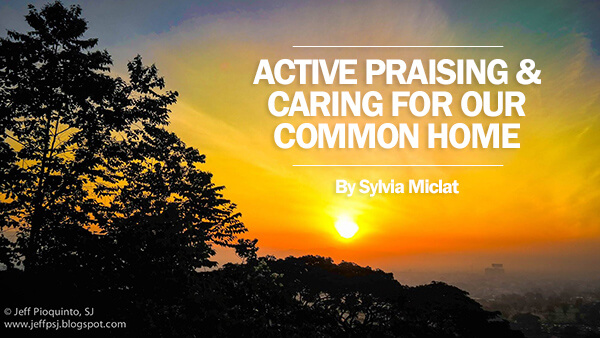


By Ms. Sylvia Miclat
Environmental Science for Social Change (ESSC)
Pope Francis’ encyclical on the environment Laudato Si’ has won many hearts, as it speaks to the world of the realities of today, both in the context of environment and social justice. He reminds us consistently to draw in those who are in the margins, those who are excluded into the core of the discussions and the discourse on the environment and economics. For Pope Francis, the global environment and human environment either improve or deteriorate together.
Pope Francis offers another vision of the interconnectedness of all life and our shared identity. Acknowledging that many have previously spoken and written similarly on the topic, the encyclical is replete with quotations and passages from his predecessors and previous bishops’ conferences all over the world. The consultations he undertook with the scientific community and global leaders in business, economics, development agencies, and other key sectors in development, provide the rigor and credibility when he explains the impact of the changing climate and how the planetary boundaries that we need to keep in check for a safe operating space for humanity are being surpassed largely through human activity. At the same time, there is a stern disappointment on the ineffectiveness of international climate change talks and the ineffectual outcomes.
What is truly refreshing in reading this lengthy document is the earnestness with which he genuinely tries to communicate to almost everybody and anybody who can read and has gone through a college education. That is his reading audience and that group is his target for action. He provides space for almost everybody in this encyclical, whatever profession or line of work and interest. It is almost an inclusive document except for those who will remain unmoved and arrogant.
Care, compassion, and mercy must assume an active passion, not passiveness. Pope Francis outlines the approaches and actions to respond effectively to this ecological crisis, providing a very practical list of questions that need to be asked to discern if what we are doing is contributing to genuine integral development. “What will it accomplish? Why? When? Where? How? For whom? What are the risks? What are the costs? Who will pay those costs and how?” This set of questions can be a universal guide for anything we wish to do, even in our daily lives.
The term integral ecology, perhaps unfamiliar to many, best describes the internal conversion Pope Francis seeks in all of us so that we can bring about the change we need in the world around us and the reconciliation with our neighbors, with ourselves, and with God. We are the answers to our questions and the solutions to our problems.
Laudato Si’ therefore calls to those of us in the Asia Pacific region, home to 4.2 billion people which is nearly 60% of the entire global population. Of this, 717 million are young people aged 15 to 24 years old, which is also around 60% of the world’s youth who reckon with obstacles to access sustainable livelihoods due to education, employment, and health care challenges (UNESCAP 2014).
As Jesuit institutions working in the various apostolates, we need to identify and locate where current efforts are responding and the gaps that remain. We must identify the capacities needed so that the social and environmental responses are efficiently undertaken. We must understand better the communities in the margins and the social exclusion that is in place so that our actions are more meaningful and with greater impact. We are greatly challenged in the Asia Pacific region and Laudato Si’ must be translated into effective action if this encyclical is to have any meaning and value.
This article is written by Ms. Sylvia Miclat of Environmental Science for Social Change (ESSC) and is first published by Ecojesuit. ESSC is a Jesuit research institution in the Philippines that promotes environmental sustainability and social justice through the integration of scientific methodologies and social processes and that networks across the Asia Pacific region in moving an agenda of science for sustainability. Visit ESSC’s website here.
For more articles on Laudato Si’, visit the Laudato Si’ Special Edition in EcoJesuit.